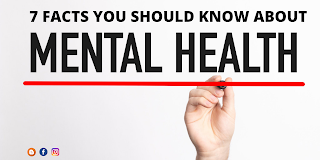7 Facts You Should Know About Mental Health
Depression is a serious illness that causes severe changes in your thinking patterns and physical behaviors. The more you learn about this illness, the more you realize that it is not just a feeling of sadness. It may be possible for you to suspect depressive behavior in a family member if you are familiar with depression's signs and how to deal with it. Reading this article will help you learn more about how to help a loved one who is depressed.

 |
| Mental Health |
Sixty-five percent of adults suffering from mental health issues have at least one other co-occurring medical condition, such as cancer, diabetes, heart disease or substance abuse. Poor mental health can make it harder to manage these conditions and vice versa. People with mental health issues are stigmatized and often misunderstood. What’s more, they don’t always seek help because of their fear of being treated differently or discriminated against because of their illness. We need to do a better job providing integrated care for patients with both kinds of issues.
Fact #5
People with mental health issues often have greater empathetic abilities. When someone is emotionally stable, they tend to empathize with others only if it’s convenient to do so or if they feel like they have a connection with someone. People with mental health problems, however, may feel compelled to listen and connect because of their own turmoil. It’s not uncommon for those who struggle to be able to relate more easily with others going through similar circumstances.
Fact #6
Mental health problems affect people of all ages, races, cultures and education levels. This is especially true among youth: According to a report from The National Alliance on Mental Illness, one in five teens experiences a severe mental disorder each year. Approximately 70% of bullied students in high schools are depressed. And 70% of mental health problems begin by age 14. As a parent, teacher, or simply an adult in general, it is important to look for signs of depression in your child and to treat them as soon as possible.
Fact #7
The number of people suffering from depression, anxiety disorders and other mental health conditions worldwide is estimated at over 1 billion. It also estimated that approximately 300 million of these individuals have jobs. In an effort to bring awareness to mental health issues and provide education for those suffering from them, it’s important to know some statistics about how they affect those who work in your office.
How to Solve the Issues of Mental Health
 |
| Mental Health Awareness |
This is a common myth; mental health problems are not any more prevalent than physical health problems. Studies have even suggested that those with mental health issues live longer on average than their healthy counterparts. Additionally, there are many people who do not experience mental health problems during their lives, and there’s no evidence to suggest they’re at a higher risk of dying young. In fact, when you take into account all-cause mortality, or deaths from any cause at all (including suicide), it turns out that there’s little difference between people with and without diagnosed mental illness. The bottom line is that people with depression don't die earlier. If anything, they might live longer!
There’s more to mental health than just being able to talk about it. The society has made a lot of progress when it comes to mental health, but it still has a stigma attached to it, so those who suffer from it stay quiet. In fact, statistics show that up to 65% of people with mental health issues aren’t getting treatment because they don’t feel they can find an outlet where they feel comfortable discussing their feelings or problems.


Comments
Post a Comment